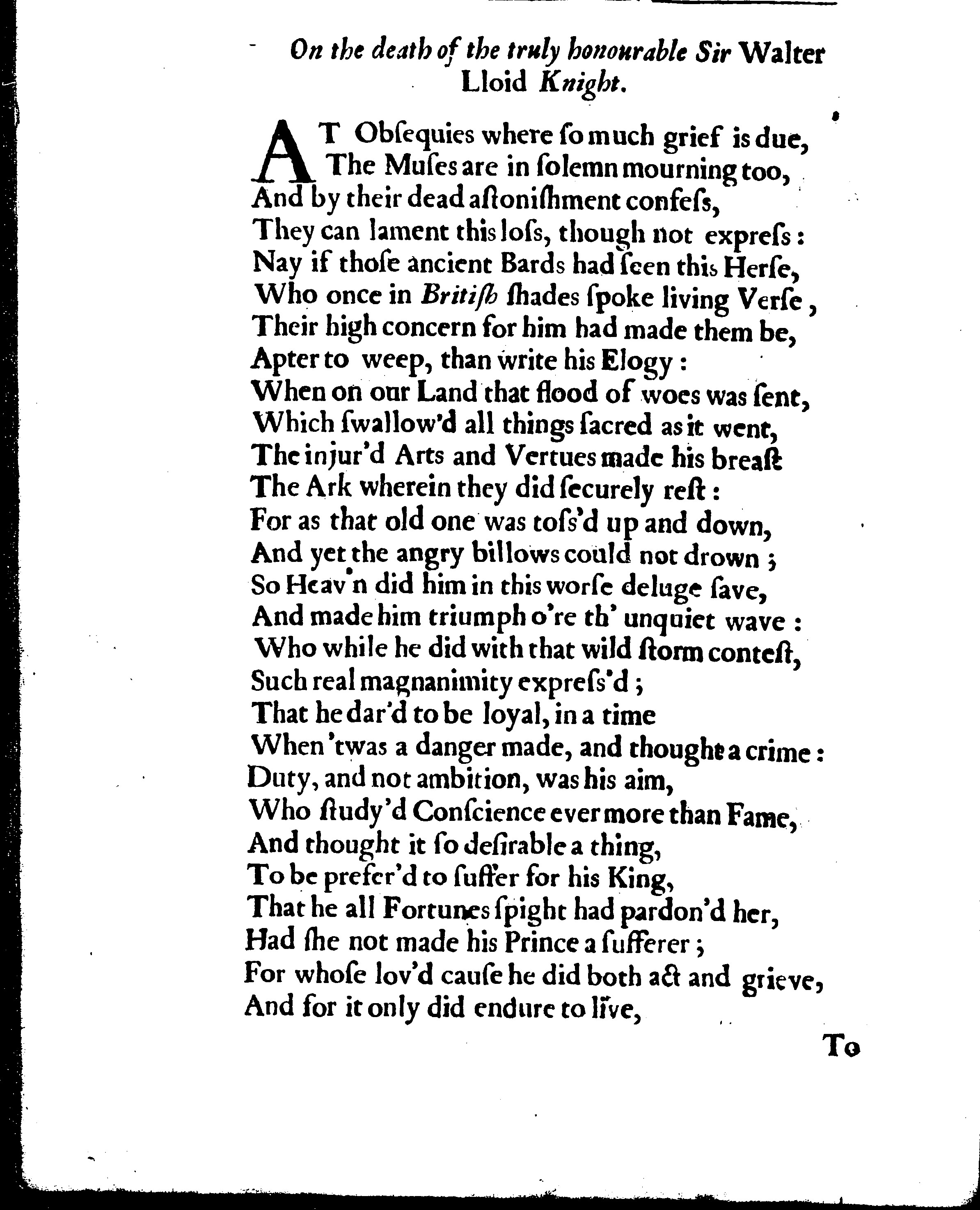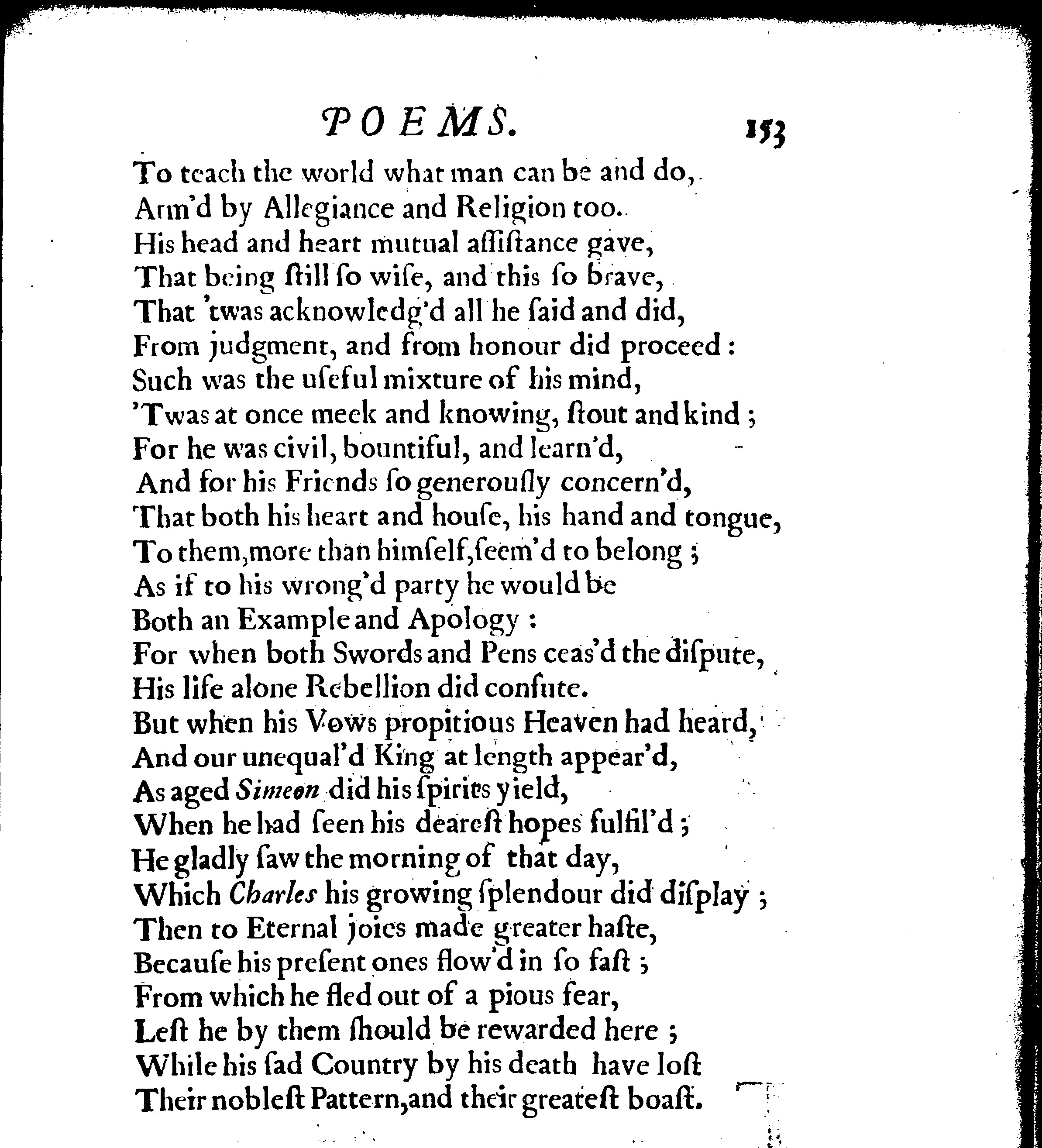"On the death of the truly honourable Sir Walter Lloid Knight"
By
Katherine Philips
Transcription, correction, editorial commentary, and markup by Staff and Research Assistants at The University of Virginia, John O'Brien, Sara Brunstetter, Rachel Retica
On the death of the truly honorable Sir
Walter Lloid KnightLloydLloyd The Royalist Sir Walter Lloyd (1580-1662?)
was the High Sheriff of Cardiganshire in 1621. He was knighted in 1643; several years later, in the charged political climate of the late 1640s, his estates were sequestered.
152
1At ObsequiesObsequiesObsequiesA funeral or burial rite (Oxford English Dictionary). where so much grief
is due,
2The MusesMusesMusesThe nine daughters of Zeus who presided over and inspired
learning in the arts and sciences (Oxford English Dictionary). are in solemn mourning
too,
3And by their dead astonishment confess,
4They can lament this loss, though not express:
5Nay if those ancient BardsBardsBardsLyric or epic poets who traditionally sang
their verse accompanied by a harp (Oxford English Dictionary). had seen this HerseHerseHerseAlternate spelling for hearse (n.): wooden structure
decorated with lighted candles, banners, and notes, including epigraphs
and poems, at a noble or royal funeral (Oxford English Dictionary).,
6Who once in British shades spoke living
Verse,
7Their high concern for him had made them be,
8Apter to weep, than write his Elogy:
9When on our land that flood of
woesFloodFloodPhilips is referring to the
English Civil War (1642-1651). The war took place between the Protestant
rebels and the Catholic monarchy of England. Oliver Cromwell led the
Protestants to victory, and King Charles I was beheaded in 1649 to usher in
the twelve-year Interregnum. was sent,
10Which swallowed all things sacred as it went,
11The injur'd Arts and Vertues, made his breast
12The Ark wherein they did securely rest:
13For as that old one was toss'd up and down,
14And yet the angry billows could not drown;
15So Heav'n did him in this worse deluge save,
16And made him triumph o're th' unquiet wave:
17Who while he did with that wild storm contest,
18Such real magnanimity express'd;
19That he dar'd to be loyal in a time
20When 'twas a danger made, and thought a crime:
21Duty, and not ambition, was his aim,
22Who study'd Conscience ever more than Fame,
23And thought it so desirable a thing,
24To be prefer'd to suffer for his KingKingKing King Charles I.,
25That he all Fortunes spight had pardon'd her,
26Had she not made his Prince a sufferer;
27For whose lov'd cause he did both act and grieve,
28And for it only did endure to live,
153
29To teach the world what man can be and do,
30Arm'd by Allegiance and Religion too.
31His head and heart mutual assistance gave,
32That being still so wise, and this so brave,
33That 'twas acknowledg'd all he said and did,
34From judgement, and from honor did proceed:
35Such was the useful mixture of his mind,
36'Twas at once meek and and knowing, stout and kind;
37For he was civil, bountiful, and learn'd,
38And for his Friends so generously concern'd,
39That both his heart and house, his hand and tongue,
40To them, more than himself, seem'd to belong;
41As if to his wrong'd party he would be
42Both an Example and Apology:
43For when both Swords and Pens ceas'd the dispute,
44His life alone Rebellion and confute.
45But when his Vows propitiousPropitiousPropitiousGiving or indicating
a good chance of success; favorable (Oxford English Dictionary). Heaven had heard,
46And our unequal'd King at length appear'd,
47As aged SimeonSimeonSimeonSimeon of the
New Testament (Luke 2:25-26) was a prophet whom the Holy Spirit
promised would not die until he had seen Jesus Christ. did his spirits yield,
48When he had seen his dearest hopes fulfil'd,
49He gladly saw the morning of that day,
50Which CharlesCharlesCharlesKing Charles II was Coronated in 1661 after
the death of Oliver Cromwell. his growing
splendour did display;
51Then to Eternal joies made greater haste,
52Because his present ones flow'd in so fast;
53From which he fled out of pious fear,
54Lest he by them should be rewarded here;
55While his sad Country by his death have lost
56Their noblest Pattern, and their greatest boast.

